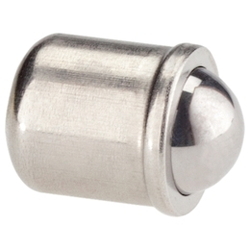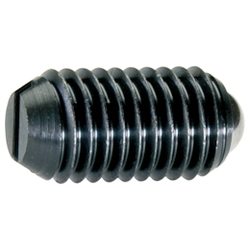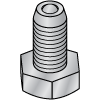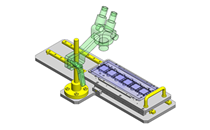(!) Since support from Microsoft will end on January 14th, 2020, Windows 7 will be excluded from the recommended environment from December 15th, 2019 on this site. Vì lý do Microsoft kết thúc hỗ trợ cho Windows 7 vào ngày 14/01/2020, Windows 7 sẽ là hệ điều hành không được khuyến khích sử dụng với trang web này từ ngày 15/12/2019.
Search by Category / Brand Tìm theo danh mục, nhãn hiệu
Search by Category Tìm theo danh mục
- Thể lệ và Giải thưởng cuộc thi "Thiết kế máy Tự động hóa 2025" do MISUMI Việt Nam tổ chức. Xem chi tiết.
TRUSCO NAKAYAMA Ball Plungers
Ball Plungers products in the Automation Components category from TRUSCO NAKAYAMA. The product can be selected based specifications such as Mounting Method, Outer Dia. M, Stroke S, Tip Material, Body Material. TRUSCO NAKAYAMA offers products around 2 items and the product specifications can
Ball Plungers products in the Automation Components category from TRUSCO NAKAYAMA. The product can be selected based specifications such as Mounting Method, Outer Dia. M, Stroke S, Tip Material, Body Material. TRUSCO NAKAYAMA offers products around 2 items and the product specifications can easily be compared. Search and select detailed specifications of parts for your machine with free CAD download. TRUSCO NAKAYAMA products are available to order through MISUMI online 24/7. Free shipping, no minimum order.
|
Mounting Method
|
|
|---|---|
Brand |
|
| CAD |
|
| Days to Ship |
|
2 itemsMặt hàng
- Sort By
-
You can add up to 6 items per a category to the compare list.

inset plunger (SUS/resin case)
TRUSCO NAKAYAMA
【特長】・はめ込みタイプのプランジャーです。・ボールとケースがステンレス製のボールプランジャーです。【用途】・本体ケースを取付穴にはめ込んで使用。位置決め、固定用。【商品仕様】・荷重(N):3.0~6.5・ストローク(mm):1.4・全長(mm):6・ボール径(mm):4.0・外径(mm):5・耐熱温度:250度・JANコード:4989999465686・トラスココード:791-5543・質量:0.6g【材質/仕上】・本体:ステンレス(SUS305)・ボール:ステンレス、焼入れ
Mounting Method Outer Dia. M(mm) Stroke S(mm) Tip Material Body Material Lock Initial Load (Range)(N) Tip Heat Treatment Main Body Surface Treatment Tip Surface Treatment Press Fit 4 ~ 8 0.8 ~ 2.4 Stainless Steel Stainless Steel / Plastic - - Hardening - - From: 24,000 VND Days to Ship: Số ngày giao hàng: 9 Day(s)  9 Day(s)
9 Day(s)
-
You can add up to 6 items per a category to the compare list.

TRUSCO NAKAYAMA
【特長】・本体・ボールがスチール製のマイナス溝付ボールプランジャーです。【用途】・本体ねじ部を回すことにより、ボールの押付圧を調整可能。位置決め、固定用。【商品仕様】・荷重(N):11.0~18.0・ねじ寸法:M6×1.00・ストローク(mm):1.0・全長(mm):14・ボール径(mm):3.5・耐熱温度:250度・JANコード:4989999465273・トラスココード:791-5616・質量:1.7g【材質/仕上】・本体:スチール・ボール:スチール、焼入れ
Mounting Method Outer Dia. M(mm) Stroke S(mm) Tip Material Body Material Lock Initial Load (Range)(N) Tip Heat Treatment Main Body Surface Treatment Tip Surface Treatment Screw (Straight Slot) 3 ~ 20 0.4 ~ 4.5 Steel / Stainless Steel Steel / Stainless Steel Not Provided - Hardening - - From: 40,000 VND Days to Ship: Số ngày giao hàng: 9 Day(s)  9 Day(s)
9 Day(s)
Loading...Tải…
ConfigureTạo
Specification/DimensionsĐặc điểm kỹ thuật / Kích thướcĐặc điểm kỹ thuật / Kích thước
-
Outer Dia. M(mm)
-
Stroke S(mm)
-
Tip Material
- Steel
- Stainless Steel
- Plastic
- Others / Ceramics
-
Body Material
- Steel
- Stainless Steel
- Brass
- Plastic
- Others
- SCM435
- SUS304
-
Lock
- Not Provided
- Provided
-
Initial Load (Range)(N)
-
Tip Heat Treatment
-
Main Body Surface Treatment
-
Tip Surface Treatment
Application example related to this categoryVí dụ ứng dụng liên quan đến danh mục này
Related Categories to Ball PlungersDanh mục liên quan đến Ball Plungers
FAQ Ball Plungers
- Question: What are ball plungers used for?
- Answer: Ball plungers are tiny tools used in different areas to help with precise positioning or locking. They have a spring-loaded ball inside a housing. When the ball is pressed, it extends, and when released, it retracts. They are commonly found in industries like manufacturing and electronics. They are useful for tasks such as aligning parts, holding them in place, or creating a detent mechanism for secure positioning.
- Question: What material is ball plunger?
- Answer: Ball plungers are usually made from different materials depending on their specific use. The most common materials are stainless steel, hardened steel, brass, and plastic. Stainless steel is resistant to rust and very strong. Hardened steel is tough and can withstand wear and tear. Brass is used when electrical conductivity is important. Plastic ball plungers are lightweight and used for less demanding tasks. The material choice depends on factors like strength, durability, and the purpose of the ball plunger.
- Question: What is the standard size of a ball plunger?
- Answer: The standard size of a ball plunger can vary depending on the manufacturer and application. However, they generally come in different diameters and lengths. Common diameters range from 3mm to 20mm, while lengths can range from 10mm to 50mm or more. These sizes are widely used, but it's important to note that specific industries or applications may have their own standard sizes based on their requirements.
- Question: How much pressure does a plunger create?
- Answer: The amount of pressure a plunger creates depends on various factors, including its design, size, and the force applied to it. Plungers typically generate pressure by compressing air or liquid trapped within a confined space. The specific pressure created can vary significantly. In household use, a plunger can create enough pressure to unclog a drain. However, in industrial applications, specialized plungers can generate much higher pressures to perform tasks such as hydraulic or pneumatic actuation.




























How can we improve?
How can we improve?
While we are not able to respond directly to comments submitted in this form, the information will be reviewed for future improvement.
Customer Privacy Policy
Thank you for your cooperation.
While we are not able to respond directly to comments submitted in this form, the information will be reviewed for future improvement.
Please use the inquiry form.
Customer Privacy Policy